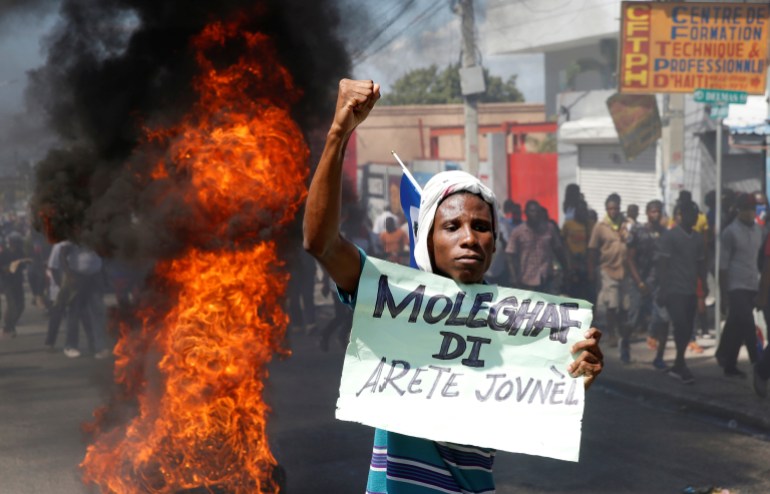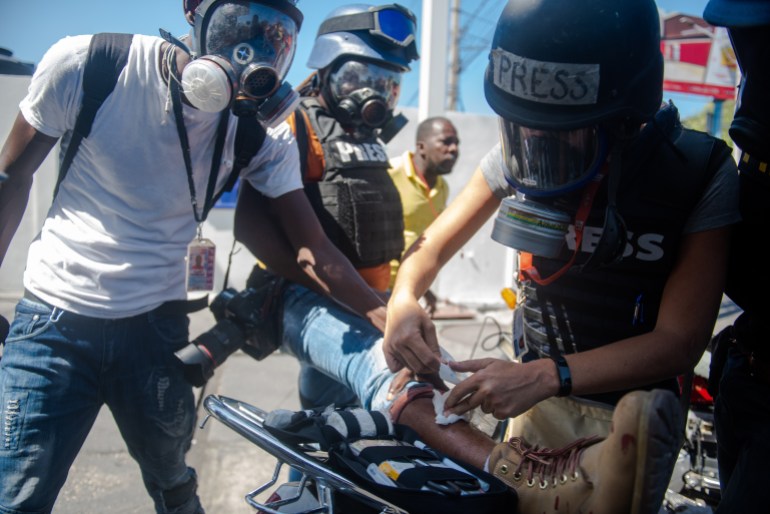What is happening in Haiti, where political crisis persists?
Opposition and civil society leaders say President Jovenel Moise’s term is over. He and his supporters say otherwise.

Haiti is in the throes of a political crisis.
Opposition leaders are disputing the mandate of President Jovenel Moise, whose term most legal experts and civil society groups have said ended on February 7. But the president and his supporters say his five-year term only expires in 2022.
Keep reading
list of 4 itemsClaude Joseph: Is Haiti’s democracy at risk?
‘Down with the dictatorship’: Protests continue in Haiti
Haiti police clash with protesters as president targets judges
The situation has rapidly devolved since Moise made clear he would not leave the presidency this month, with government officials alleging a failed coup took place. Nearly two dozen people were arrested, including a supreme court judge and a senior police official.
Protesters angered over the president’s refusal to leave office met a crackdown in Port-au-Prince, the capital. Journalists have been injured while covering the rallies. Anger and frustration have continued to boil over into the streets.
How did Haiti get to this point – and where does it go from here?
The Constitution
Moise won a first round of elections in October 2015. But the vote was marred by widespread voter fraud and a presidential runoff was pushed back several times. A vote was held again in November 2016 and Moise won with 55.6 percent support. He officially took office on February 7, 2017.
Article 134-1 of the Haitian Constitution states, “the duration of the presidential mandate is five years. This period begins and ends on the February 7 following the date of elections”.
But Article 134-2 stipulates that “in case the vote cannot take place before February 7, the elected president takes office immediately after the vote is confirmed and his mandate is expected to begin on February 7 in the year of the election”.
The dispute is over whether Moise’s five-year term began in 2016 – after the initial elections he won – or in 2017, as the president and his supporters say.
In the absence of a constitutional council, Haitian jurists submit opinions.
In this case, the Haitian Bar Federation, the Superior Council of Judicial Power and Quisqueya University have said Moise’s mandate ends in 2021. Several Haitian civil society groups and intellectuals also urged Moise to leave office this month, while the Episcopal Conference has said, “No one is above the laws and the Constitution”.
But in an address to the nation on February 7, Moise listed his administration’s achievements and said he had another year in his mandate. “Democracy works when we all agree to play by the rules of the game … Today marks the first day of my fifth year,” he said.
Consolidating power
Haiti’s electoral council postponed legislative elections indefinitely in October 2019, Human Rights Watch (HRW) has reported, and Moise has been governing by decree since January 2020, when the legislature’s mandate expired. “Moise blamed Parliament for the postponement, for failing to approve an electoral law, while his opponents accused him of manoeuvres to hijack the process,” HRW said.
In a tweet on January 13 of last year, Moise announced the close of the 50th legislature, saying the terms of all deputies in the lower house (Chamber of Deputies) were over, as were those of two-thirds of the Senate.
Mon Administration a reçu du peuple haïtien un mandat constitutionnel de 60 mois. Nous en avons épuisé 48. Les 12 prochains mois seront consacrés à la réforme du secteur de l’énergie, la réalisation du référendum et l’organisation des élections.
— Président Jovenel Moïse (@moisejovenel) February 7, 2021
Translation: My administration received a 60-month constitutional mandate from the Haitian people. We have exhausted 48 [months]. The next 12 months will be focused on energy sector reform, holding the referendum and organising elections.
Moise recently issued decrees that effectively removed judges from the supreme court (Cour de Cassation) in violation of the Constitution. He then appointed replacements to the court, also without following constitutional guidelines, HRW said.
He has also formed an electoral council and consultation committee to prepare a new constitution, for which he plans to hold a referendum on April 25. Moise has said the current constitution “is one of the sources of social, economic and political crises that the country is currently experiencing”.
As part of his reforms, Moise intends to eliminate the position of prime minister, a post he has argued gives too much power to someone who is not directly elected. Under the current constitution, Haiti’s prime minister is accountable to Parliament and cannot be dismissed by the president.
Renald Luberice, secretary general of Haiti’s council of ministers, did not respond to Al Jazeera’s request for comment. Guichard Dore, an adviser to the president, also did not respond to a request for comment.
In an interview with Talk to Al Jazeera, Foreign Minister Claude Joseph said, “The Constitution is clear that the president’s term is five years; he took office in 2017 so he’s going to leave in 2022”.
Joseph accused the opposition of using “violent” and “illegal” means to try to force Moise to step down. “They have to wait their turn. They have to use peaceful means because we do not have any problem with opposition, it’s a democracy. What we reject is violence,” he said.
Country paralysed
Meanwhile, demonstrators continue to demand Moise leave office – thousands marched in Port-au-Prince on February 14, and more protests are expected on Sunday – as the opposition has called for a “continuous, renewed and permanent mobilisation”.
“The opposition considers Moise to be a de facto president. His term ended on February 7, 2021,” former Senator Youri Latortue, one of the main opposition figures in Haiti, told Al Jazeera. “We’re waiting on the United States to recognise the end of his mandate, and that there will be an inevitable transition.”
US State Department spokesman Ned Price told reporters this month that Haiti must “organise free and fair elections so that Parliament may resume its rightful role” – but said Washington agreed with the Organization of American States that a new president should succeed Moise “when his term ends on February 7, 2022”.

Latortue said the United Nations must say Moise’s mandate ended this month. He also accused the UN Integrated Office in Haiti (BINUH) of overstepping its mandate: “Never was the BINUH mandated with supporting an unconstitutional referendum or imposing a new Haitian constitution,” he said.
On February 22, Helen La Lime, the head of BINUH, said while many Haitians view the current charter as the source of many problems, the Haitian government’s process to change it is seen by many as illegitimate. “All sectors of Haitian … should be provided with ample opportunity to debate and to contribute to the draft text,” she said.
Amid the political tug-of-war, much of Haitian society has come to a standstill: the education system has been paralysed and businesses are running at half-speed. Associations representing the country’s judges have called for a work stoppage until Moise “respects the Constitutions and the laws” of Haiti.
Earlier this month, Moise’s government said it thwarted an attempted coup against the president. Yvickel Dieujuste Dabresil, a supreme court judge, was arrested on the morning of February 7 for an “attempted coup” and “conspiracy against the internal security of the state”. He was released three days later after international pressure.

Police have cracked down on demonstrations, and several protesters, as well as journalists, have been injured.
“In nearly all the demonstrations, we count journalists as victims,” said Jacques Desrosiers, secretary-general of the Haitian Journalists Association (AJH). “The frequency of attacks against journalists leaves us to think that it isn’t collateral damage; we are convinced that the press is being targeted.”
Gang violence
Haiti is also dealing with widespread gang violence.
Pro-government and pro-opposition armed groups have instilled fear in neighbourhoods in which they exercise control, the Fondation Je Klere civil society group wrote in a June 2020 report. “In popular neighbourhoods, elections are never really free,” the report reads. “In this context, where nearly a third of the national territory is controlled by gangs, their political weight over the next election is clear.”
Last February, the UN urged the Haitian government to end impunity for gang leaders, including former police officer Jimmy Cherizier, who now heads an alliance of gangs called G9. Cherizier has been accused of being involved in a 2018 massacre in La Saline neighbourhood of Port-au-Prince.
The US also sanctioned him in December, saying “Cherizier led armed gangs in a five-day attack in multiple Port-au-Prince neighborhoods in which civilians were killed and houses were set on fire” in May 2020.
Pierre Esperance, coordinator of the National Network in Defence of Human Rights (RNDDH), a Haitian human rights group, pointed to the large swaths of Haiti under the control of armed gangs and accused the government of losing control of the situation.
“This government is worse than those of the Duvaliers,” said Esperance, referring to Francois “Papa Doc” Duvalier and his son, Jean Claude “Baby Doc” Duvalier, who ruled Haiti from 1957 until 1986.
“The United States, Canada, the UN and the European Union are endorsing the excesses of power. The people have the last word to thwart this dictatorship.”